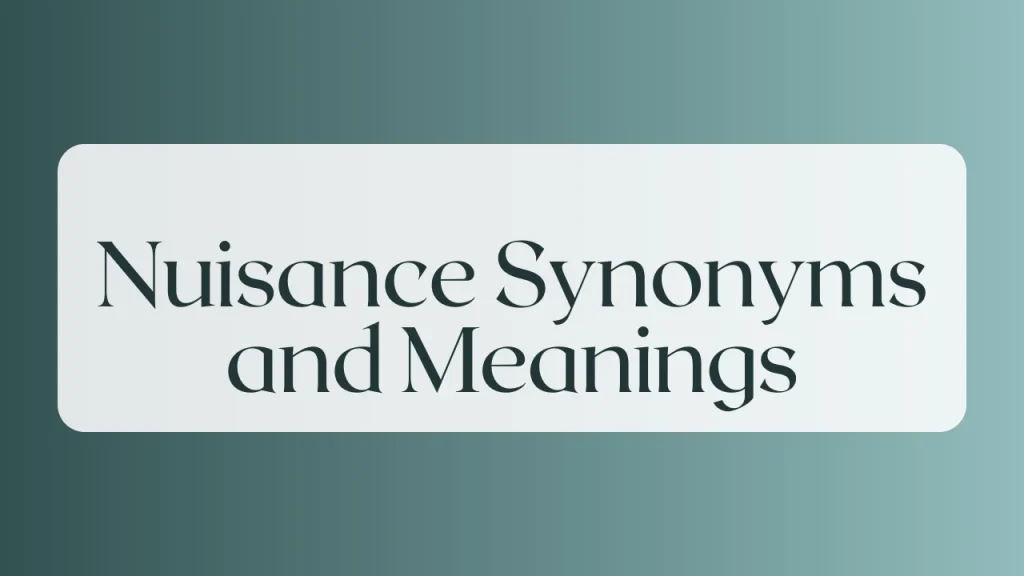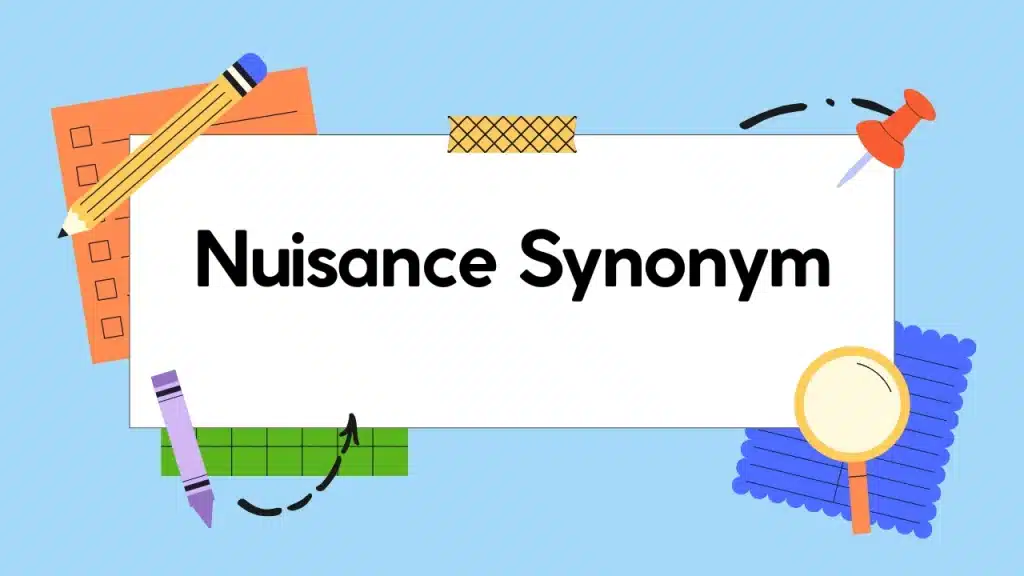When you hear the word nuisance, you often think of something or someone that annoys or disturbs daily life. But what if you need a nuisance synonym for writing, learning, or improving your vocabulary? Knowing the right alternatives can help you express your ideas more clearly. This article will explore meanings, examples, and even structured information to guide you better. And just like exploring 50 ways to say goodbye, discovering synonyms of nuisance adds depth to your language.
20 ways to say Nuisance Synonym
Here are 20 nuisance synonyms with example sentences so you can see how each one works in context:
1. Irritation
Her loud chewing quickly became an irritation to everyone at the table.
2. Bother
It’s such a bother when people interrupt you while working.
3. Aggravation
The broken elevator caused daily aggravation for the office workers.
4. Disturbance
The fireworks created a major disturbance in the quiet neighborhood.
5. Disruption
The sudden rainstorm caused a disruption to the outdoor concert.
6. Trouble
That squeaky chair has been more trouble than it’s worth.
7. Inconvenience
The road closure was a big inconvenience for commuters.
8. Menace
The stray dog became a menace to people in the park.
9. Pest
Mosquitoes are the worst pest during summer nights.
10. Hindrance
His negative attitude was a serious hindrance to progress.
11. Obstruction
The fallen tree was an obstruction on the hiking trail.
12. Interference
Loud music from next door was an interference with my studies.
13. Problem
The slow Wi-Fi was a constant problem during online meetings.
14. Irritant
Smoke is a major irritant for people with asthma.
15. Frustration
Losing my keys again was a huge frustration.
16. Burden
Carrying all that luggage alone was a heavy burden.
17. Headache
Filling out those forms is always a headache for employees.
18. Hassle
Returning the product to the store was such a hassle.
19. Torment
The endless construction noise became a daily torment for the residents.
20. Annoyance
The constant dripping of the faucet was a real annoyance during the night.
What Does Nuisance Really Mean?
The word nuisance comes from an old French term meaning harm or annoyance. In modern English, it refers to something that bothers, irritates, or causes inconvenience. For example, a noisy neighbor, a buzzing mosquito, or a broken alarm can all be called nuisances. Finding a nuisance synonym helps you avoid repeating the same word and adds variety to your speech or writing.
Everyday Use of Nuisance Synonym
In daily conversations, people often replace nuisance with words like annoyance, bother, or irritation. These are simple and familiar terms that everyone understands. When you want to keep your writing smooth and natural, choosing the right synonym ensures clarity. Using it in friendly talks or professional writing makes your language more flexible and engaging.
Nuisance Synonyms and Meanings

Here is a table that explains some common synonyms for nuisance and what they mean:
| Nuisance Synonym | Meaning | Example Sentence |
|---|---|---|
| Annoyance | Something that irritates or bothers | The traffic jam was a big annoyance. |
| Irritation | A source of frustration | His constant humming caused irritation. |
| Menace | Something harmful or dangerous | That stray dog was a menace to the street. |
| Inconvenience | A situation causing difficulty | The delay was an inconvenience for passengers. |
| Pest | A bothersome person or thing | Flies in the kitchen are a pest. |
It can fit different contexts depending on whether you are describing a minor bother or a serious problem.
Importance of Choosing the Right Word
Words carry weight, and selecting the right synonym makes your expression more powerful. While nuisance is often casual, menace has a stronger and more negative tone. On the other hand, inconvenience sounds lighter and polite. Learning when to use a specific it will make your sentences more accurate. Just as people often use funny ways to say hello in conversations to keep things interesting, using synonyms helps bring variety to your communication.
in Literature and Writing
Writers often avoid repeating the same word to keep their work engaging. In stories, you might read about a villain described as a menace rather than a nuisance. In essays, the word inconvenience might feel more formal. It helps writers keep their work polished while delivering the exact meaning they want.
Contextual Usage
Here is how different synonyms can be used in various settings:
| Context | Best Synonym to Use | Why It Works |
|---|---|---|
| Casual talk | Annoyance, bother | Simple and easy to understand |
| Formal writing | Inconvenience | Sounds polite and professional |
| Storytelling | Menace | Adds drama and strength |
| Everyday humor | Pest | Light-hearted and funny |
This shows that it is not only about replacing a word but about matching the mood and setting of your sentence.
Nuisance in Legal Terms
The word nuisance also has legal meaning, especially in property and environmental law. In this sense, nuisance refers to something that interferes with another person’s enjoyment of their property. For example, loud noise at night or pollution from a factory may be labeled as nuisances. In legal documents, it might include terms like disturbance or hazard, giving precision to formal contexts.
Why Learning Synonyms Improves Communication
Building a strong vocabulary makes communication richer. By knowing multiple words, you can avoid sounding repetitive. For example, instead of saying “The barking dog was a nuisance” again and again, you can write “The barking dog was an irritation.” Using it in such cases makes your writing smooth and more enjoyable to read.
Synonyms in Modern Usage
Modern English often favors simple and direct terms. In social media, blogs, or everyday messages, people choose easy synonyms like annoyance or bother. Yet in professional reports or news articles, words like inconvenience or disturbance appear more often. Learning when and where to use it will make your language fit perfectly with the audience.
Final Thoughts
A nuisance is anything that disturbs peace, whether small or serious. But instead of overusing the same word, adding variety with a nuisance synonym makes your writing better. From annoyance and irritation to menace and inconvenience, each word has its own place. Just like learning different expressions for greetings or farewells, synonyms add depth to communication. By practicing and applying them, you not only improve vocabulary but also bring more life to your conversations and writing.







